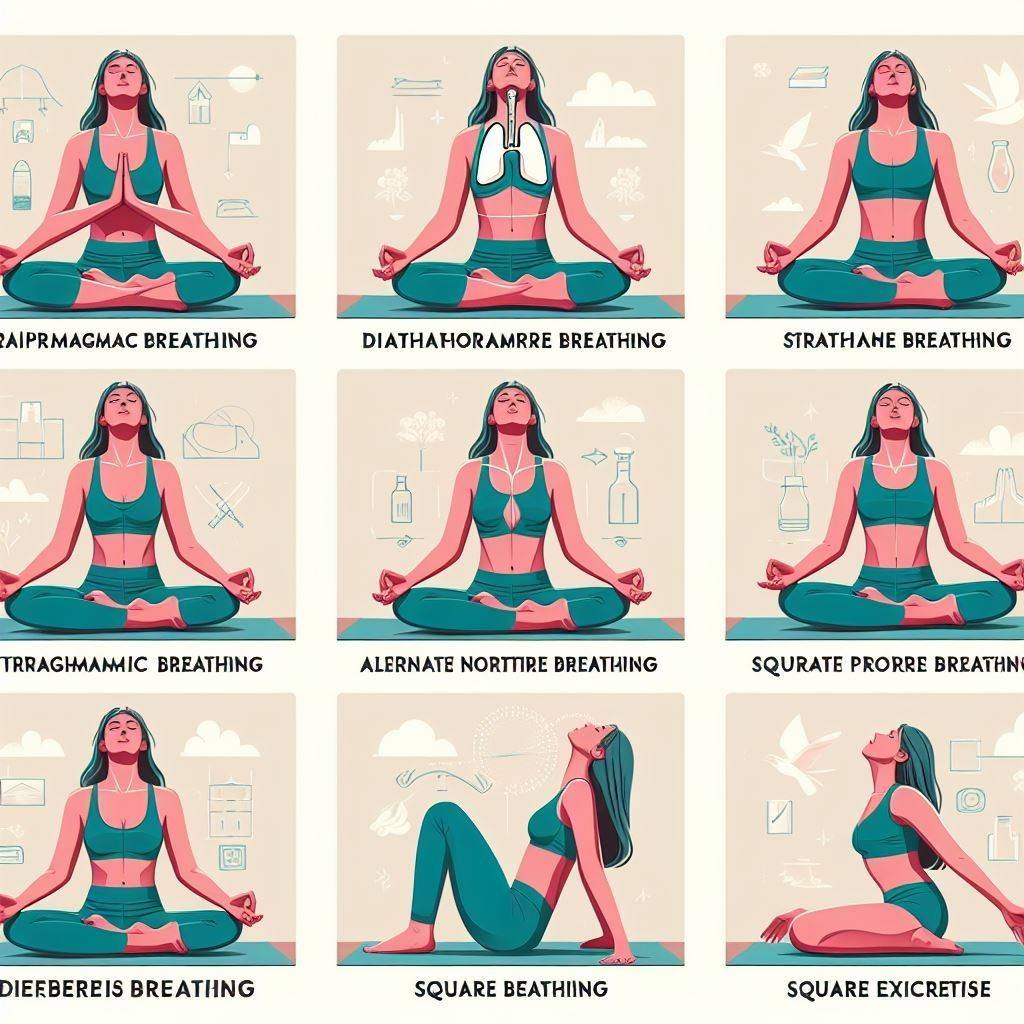Discover 12 effective breathing exercises to reduce stress and promote relaxation. Improve your well-being with these techniques.
Introduction
Life can be stressful. Work deadlines, family obligations, health issues, and other challenges can all contribute to feeling pressed for time and overwhelmed. While some stress is normal, chronic stress takes a toll on your mental and physical health. Learning to keep your stress levels in check is important for your well-being. One of the most effective ways to combat stress is through breathing exercises.
Breathing exercises are easy-to-learn techniques that help activate the body’s natural relaxation response. Slow, deep breathing cuts down on tension, increases blood flow, and brings more oxygen to the brain and other organs. This provides almost instant calm and clarity. Best of all, you can practice breathing techniques anywhere at any time.
In this article, we’ll explain 10 simple breathing exercises to reduce stress. Try incorporating these into your daily routine for less anxiety and more inner peace.
How Breathing Exercises Help Manage Stress

Before diving into the specific techniques, let’s look at how controlled breathing helps counteract the stress response and induces relaxation:
- Slows down breathing rate – Stress typically speeds up your breathing. Slowing your breath signals your nervous system to relax.
- Prolong exhalation – Longer exhales trigger relaxation hormones and lower blood pressure.
- Promotes fuller breaths – Deep inhalation and exhales exchange more oxygen and expel more carbon dioxide.
- Clears the mind – focused, rhythmic breathing requires mindful attention, which distracts from worrying thoughts.
- Balances the nervous system – Deep breathing shifts the autonomic nervous system from “fight or flight” to “rest and digest”.
- Reduces muscle tension – Full oxygen exchange releases physical tension held in the muscles.
- Lower heart rate – The slower breathing pace brings the heart rate down.
As you can see, the physical effects of breathing exercises induce the body’s natural relaxation response. When practiced regularly, they help build resilience to stress. Let’s look at 10 techniques to try.
12 Breathing Exercises to Reduce Stress

-
Basic Belly Breathing
This fundamental breathing exercise focuses on deep belly inhales and exhales to trigger calm.
- Sit or lie comfortably with one hand on your belly.
- Inhale slowly and deeply through your nose for a count of 4, feeling your belly expand.
- Exhale slowly through pursed lips for a count of 6.
- Repeat for 10-15 breaths.
Do this basic belly breathing several times throughout the day to relieve stress.
-
Morning Breathwork
Start your day with an invigorating round of breathwork. The energizing flow of oxygen will set you up for less stress throughout the day.
- Sit comfortably with your eyes closed. Inhale and sweep your arms outward and up overhead.
- Exhale powerfully through your mouth, sweeping your arms down.
- Repeat with 10-15 more cleansing breaths.
Practice just 5 minutes of this morning’s breathwork to wake up feeling calm and centred.
-
Alternate Nostril Breathing
This yogic breathing technique channels energy and balance. It’s an excellent preparation for meditation or sleep.
- Sit comfortably and hold your right thumb over your right nostril, inhaling through the left.
- Close the left nostril with your right ring finger and release the right nostril. Exhale through the right.
- Inhale right, close right, release left, exhale left. This is a 1 cycle.
- Repeat for up to 10 cycles, focusing on slow steady breaths.
Do this alternate nostril breathing when you need to find your center in stressful times.
-
4-7-8 Breathing
The 4-7-8 breathing exercise is a powerful stress reliever and sleep aid.
- Sit upright and place the tip of your tongue on the roof of your mouth.
- Exhale completely through your mouth.
- Inhale quietly through your nose for a count of 4.
- Hold your breath for a count of 7.
- Exhale audibly through your mouth for a count of 8.
- Repeat for 10-15 cycles.
Practice this technique anytime during the day to calm your mind. It also helps quiet your thoughts before bedtime.
-
Mindful Walking
Bring a mindful awareness to your breathing while walking to melt away stress.
- Stand tall with relaxed shoulders, walking at a natural pace.
- On each step, mentally recite “Inhale 1, exhale 1…” up to 10.
- Focus on making your inhale and exhale the same length.
- When you reach 10, start over from 1 again.
Continue for 10-15 minutes, keeping your breath smooth and even.
-
Ocean Breath
The “ocean” sound of this breathing exercise instantly evokes the relaxing sensations of being near water.
- Sit comfortably and close your eyes. Take a deep inhale through your nose.
- Exhale slowly through your mouth, making an “ohhhhh” ocean sound.
- Visualize your stress and tension flowing out with your breath.
- Repeat for 10-15 cycles of full inhales and calming ocean exhales.
Use this technique to rest during hectic days. The ocean associations trigger a relaxation response.
-
Roll Breathing
This unique breathing technique involves breathing in and out through different mouth positions. The mechanics help distract the mind from worrying thoughts.
- Sit upright and inhale deeply through your nose.
- Exhale slowly through pursed lips saying “Haaaaaa”.
- Inhale again through your nose.
- Exhale making an “o” shape with your lips, saying “oooooh”.
- Repeat, alternating the exhale mouth shape between “haaa” and “oooo” for 10 cycles.
Roll breathing provides stress relief with a new way to focus on your breathing.
-
Counted breathing
Counting your inhales and exhales helps anchor your attention when stressed.
- Sit comfortably and close your eyes.
- Inhale slowly through your nose for a count of 5.
- Exhale slowly through your mouth for a count of 6.
- Repeat for 10-15 breaths, keeping the count steady.
This simple counted breathing brings a focused presence that alleviates anxiety.
-
Morning Gratitude Breaths
Cultivate an attitude of gratitude while energizing your body and breathing.
- Stand comfortably and extend your arms out to the sides on an inhale.
- Bring your hands together in front of your heart on an exhale, thinking of something you’re grateful for.
- Repeat with 10-15 cleansing breaths, giving thanks on each exhale.
Practicing mindful gratitude breaths first thing in the morning sets a positive tone for your day.
-
Heart-Centered Breathing
This loving-kindness breathing exercise promotes feelings of compassion and connectedness.
- Sit comfortably, placing your hand over your heart. Breathe slowly in and out.
- On each inhale, visualize breathing in peace and love.
- On each exhale, mentally direct feelings of love and calm outward.
Continue for 10-15 breaths focused on your heart center. This helps counteract feelings of isolation and irritability from chronic stress.
-
Square Breathing
This structured square breathing method provides a rhythmic pattern to follow when you’re feeling anxious or overwhelmed.
- Sit upright and inhale steadily for a count of 4 seconds.
- Hold your breath for 4 seconds.
- Exhale steadily for 4 seconds.
- Hold empty for 4 seconds before your next inhale.
- Repeat for 10 cycles, keeping your inhale, hold, exhale, and empty hold even.
The predictability is grounding when stress strikes.
-
Humming Bee Breath
The humming vibration of this technique releases muscular tension and stimulates a sense of joy.
- Sit comfortably and close your eyes. Inhale through your nose.
- Exhale slowly through your nose while humming a long “hmmmmm” sound.
- Keep the exhale twice as long as the inhale.
- Repeat for 10-15 rounds, visualizing stress, and leaving your body on each exhale.
The resonant hum helps evoke a calm, centred feeling.
Extra Tips for Effective Breathing Exercises
- Set a reminder to take breath breaks throughout your day. This ensures you practice regularly for stress management.
- Find breathing buddies – friends, coworkers, or family who can join you for an afternoon breathing session. This mutual support makes consistency easier.
- Observe any physical tension as you inhale and exhale. Consciously relax those muscle groups as you breathe to melt away tightness.
- Visualize the stresses leaving your body with each long exhale. Picture worries and negative emotions flowing out of you.
- Use essential oils with aromas like lavender and eucalyptus to promote relaxation as you breathe.
- Listen to calming music while practicing slower breathing rhythms to enhance the stress-relieving benefits.
- Keep a journal to record how you feel before and after breathing exercises. Note any positive changes to your outlook or energy levels.
- Combine with meditation by focusing on your breath as a mental focal point to mute your thoughts.
- Vary the techniques based on your needs – try more stimulating breaths when tired or calmer approaches when anxious.
Breathing exercises are one of the fastest ways to initiate a relaxation response in your body, leading to clearer thinking and less stress. Try out these 10 techniques and make breathwork part of your daily self-care routine. Just a few minutes of focused deep breathing can provide incredible benefits, both mental and physical. With practice, you’ll be able to tap into that inner calm wherever you are.
Conclusion
Stress is an unavoidable part of life. But you don’t have to let it take over your health and happiness. Simple breathing techniques can help reset your mind and body quickly whenever you feel anxious or overwhelmed. Next time you notice stress building, take a few minutes to try belly breathing, a gratitude breath practice, or another one of these 10 exercises. Make deep breathing a part of your daily self-care routine. The benefits for both your mental and physical well-being will amaze you.



